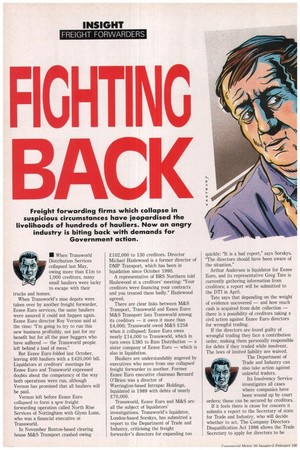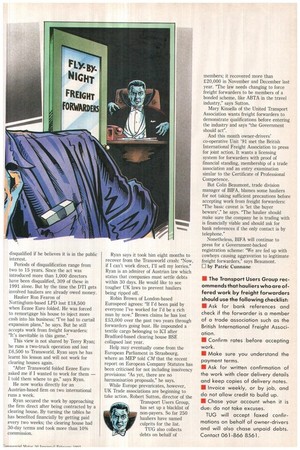FIGHTI NG Freight forwarding firms which collapse in suspicious circumstances have
Page 28

Page 29

If you've noticed an error in this article please click here to report it so we can fix it.
jeopardised the livelihoods of hundreds of hauliers. Now an angry industry is biting back with demands for Government action.
• When Transworld Distribution Services collapsed last May, owing more than £1m to 1,000 creditors, many small hauliers were lucky to escape with their trucks and homes.
When Transworld's nine depots were taken over by another freight forwarder, Eezee Euro services, the same hauliers were assured it could not happen again. Eezee Euro director Roy Vernon said at the time: "I'm going to try to run this new business profitably, not just for my benefit but for all the poor huggers who have suffered — the Transworld people left behind a load of mess."
But Eezee Euro folded last October, leaving 400 hauliers with a £420,000 bill. Liquidators at creditors' meetings for Eezee Euro and Transworld expressed doubts about the competency of the way both operations were run, although Vernon has promised that all hauliers will be paid.
Vernon left before Eezee Euro collapsed to form a rkew freight forwarding operation called North Rise Services of Nottingham with Glynn Lunn, who was a financial executive at Transworld.
In November Buxton-based clearing house M&S Transport crashed owing £102,000 to 130 creditors. Director Michael Hazlewood is a former director of DMP Transport, which has been in liquidation since October 1990.
A representative of BRS Northern told Hazlewood at a creditors' meeting: "Your creditors were financing your contracts and you treated them badly." Hazlewood agreed.
There are clear links between M&S Transport, Transworld and Eezee Euro: M&S Transport lists Transworld among its creditors — it owes it more than £4,000; Transworld owed M&S £258 when it collapsed; Eezee Euro owes nearly £14,000 to Transworld, which in turn owes £385 to Ram Distribution — a sister company of Eezee Euro — which is also in liquidation.
Hauliers are understandably angered by executives who move from one collapsed freight forwarder to another. Former Eezee Euro executive chairman Bernard O'Brien was a director of Warrington-based Intrapac Holdings, liquidated in 1989 with debts of nearly £70,000.
Transworld, Eezee Euro and M&S are all the subject of liquidators' investigations. Transworld's liquidator, London-based Sorskys, has submitted a report to the Department of Trade and Industry, criticising the freight forwarder's directors for expanding too quickly: "It is a bad report," says Sorskys. The directors should have been aware of the situation."
Arthur Andersen is liquidator for Eezee Euro, and its representative Greg Tate is currently gathering information from creditors; a report will be submitted to the DTI in April.
Tate says that depending on the weight of evidence uncovered — and how much cash is acquired from debt collection — there is a possibility of creditors taking a civil action against Eezee Euro directors for wrongful trading.
If the directors are found guilty of wrongful trading they face a contribution order, making them personally responsible for debts if they traded while insolvent. The laws of limited liability are waived.
The Department of Trade and Industry can also take action against unlawful traders.
Its Insolvency Service investigates all cases where companies have been wound up by court orders; these can be secured by creditors.
If it feels there is cause for concern it submits a report to the Secretary of state for Trade and Industry, who will decide whether to act. The Company Directors Disqualification Act 1986 allows the Trade Secretary to apply for directors to be disqualified if he believes it is in the public interest.
Periods of disqualification range from two to 15 years. Since the act was introduced more than 1,000 directors have been disqualified, 309 of these in 1991 alone. But by the time the DTI gets involved hauliers are already owed money.
Haulier Ron Fearon of Nottingham-based LPD lost £18,500 when Eezee Euro folded. He was forced to remortgage his house to inject more cash into his business: "I've had to curtail expansion plans," he says. But he still accepts work from freight forwarders: "It's inevitable in this game," This view is not shared by Terry Ryan; he runs a two-truck operation and lost £6,500 to Transworld. Ryan says he has learnt his lesson and will not work for clearing houses again.
"After Transworld folded Eezee Euro asked me if I wanted to work for them — I told them where to go," says Ryan.
He now works directly for an Austrian-based firm on two international runs a week.
Ryan secured the work by approaching the firm direct after being contracted by a clearing house. By turning the tables he has benefited financially by getting paid every two weeks; the clearing house had 30-day terms and took more than 10% commission. Ryan says it took him eight months to recover from the Transworld crash: "Now, if I can't work direct, I'll sell my lorries." Ryan is an admirer of Austrian law which states that companies must settle debts within 30 days. He would like to see tougher UK laws to prevent hauliers being ripped off.
Robin Brown of London-based Eurospeed agrees: "If I'd been paid by everyone I've worked for I'd be a rich man by now." Brown claims he has lost £53,000 over the past two years through forwarders going bust. He impounded a textile cargo belonging to ICI after Bradford-based clearing house BSE collapsed last year.
Help may eventually come from the European Parliament in Strasbourg, where an MEP told CM that the recent report on European Company Statutes has been criticised for not including insolvency provisions: "As yet, there are no harmonisation proposals," he says.
While Europe prevaricates, however, UK Trade associations are beginning to take action. Robert Sutton, director of the Transport Users Group, has set up a blacklist of non-payers. So far 250 hauliers have named culprits for the list.
TUG also collects debts on behalf of members; it recovered more than £20,000 in November and December last year. "The law needs changing to force freight forwarders to be members of a bonded scheme, like ABTA in the travel industry," says Sutton.
Mary Kinsella of the United Transport Association wants freight forwarders to demonstrate qualifications before entering the industry and says "the Government should act".
And this month owner-drivers' co-operative Unit '91 met the British International Freight Association to press for joint action, It wants a licensing system for forwarders with proof of financial standing, membership of a trade association and an entry examination similar to the Certificate of Professional Competence.
But Colin Beaumont, trade division manager of BIFA, blames some hauliers for not taking sufficient precautions before accepting work from freight forwarders: "The basic caveat is 'let the buyer beware'," he says. "The haulier should make sure the company he is trading with is financially viable and should ask for bank references if the only contact is by telephone."
Nonetheless, BIFA will continue to press for a Government-backed registration scheme: "We are fed up with cowboys causing aggravation to legitimate freight forwarders," says Beaumont. 0 by Patric Cunnane
















































































